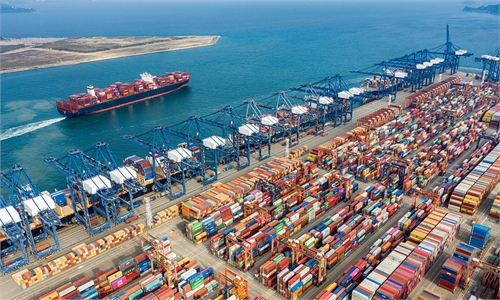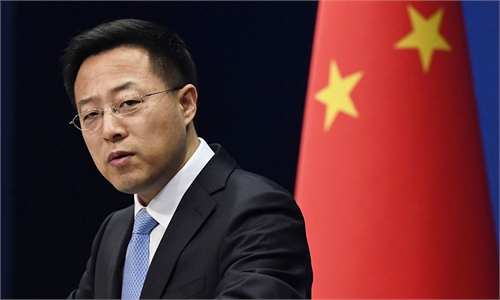
A citizen walks on the street in Siauliai, Lithuania, Nov. 6, 2021. Photo: Xinhua
Although the US has repeatedly voiced its support for Lithuania, the country is beset with difficulties at home as a latest poll indicates that the Lithuanian government's approval ratings have hit a decade low, and the Lithuanian president called its government's decision to allow a "Taiwan representative office" in Vilnius a mistake.US Secretary of State Antony Blinken and the representatives of the Bucharest Nine group on Monday expressed their solidarity with Lithuania amid the escalating "political pressure and economic coercion" by China, according to a statement by the US State Department.
The Bucharest Nine comprises countries on NATO's eastern border - Bulgaria, the Czech Republic, Estonia, Lithuania, Latvia, Poland, Romania, Slovakia and Hungary.
In response, Wang Wenbin, spokesperson of the Chinese Foreign Ministry, said at a press conference on Tuesday that the US has repeatedly defended the wrong words and deeds of Lithuania and tried to win over a small circle of "Taiwan independence" forces in the name of supporting Lithuania, which would only make the international community question the sincerity of the US claiming to adhere to the one-China policy and its real intentions on the Taiwan question.
Despite continued support from the US, Lithuania is facing discontent at home and abroad. The latest poll in Lithuania published in December 2021 showed the Lithuanian government's approval ratings have hit record lows.
The poll showed the share of respondents who say they trust the government falling to 17.3 percent in December, from 21 percent in November, and those who distrust rising to 47.8 percent from 39.6 percent, Lithuanian Radio and Television (LRT) reported.
Lithuania made a mistake when it allowed Taiwan to open a representative office in Vilnius under its own name, thus provoking a strong reaction from China, Lithuanian President Gitanas Nausėda said on Tuesday.
"I think it was not the opening of the office that was a mistake, but the name, which was not coordinated with me," he told the Žinių Radijas radio station.
"I believe the name was the spark, and now we have to deal with the consequences," the president said.
Vilija Blinkevičiūtė, the leader of the opposition Social Democratic Party (LSDP), has also criticized the government's policy toward China, calling it "unprofessional."
Lithuania has started to suffer the consequences of its anti-China policy. Its EU allies and domestic companies have also expressed dissatisfaction, observers said.
Washington instigated Vilnius to play the democratic card on the Taiwan question, but it caused public discontent, said Cui Hongjian, director of the Department of European Studies at the China Institute of International Studies.
The US has offered plenty of rhetorical support, but little material or tangible support for Lithuania, Liu Zuokui, a research fellow on European studies at the Chinese Academy of Social Sciences, told the Global Times on Tuesday.
Such lip service means nothing to Lithuania and its people as the country has suffered from economic losses caused by some of its politicians who followed Washington's anti-China policy for their personal gain, Liu pointed out.




